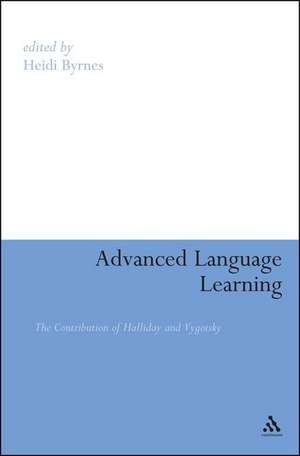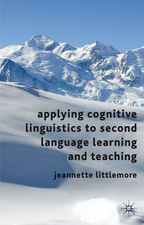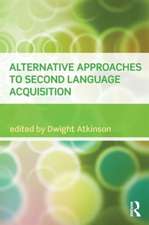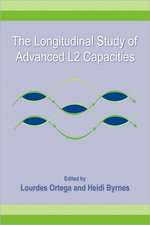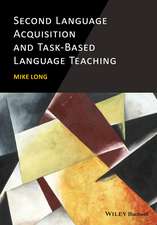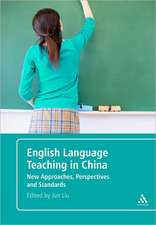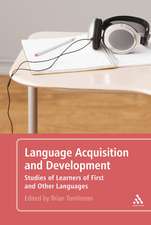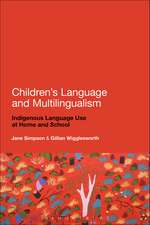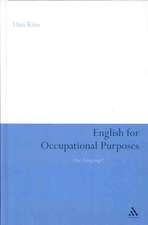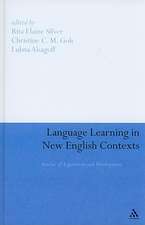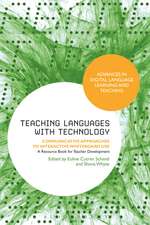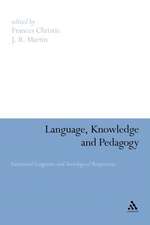Advanced Language Learning: The Contribution of Halliday and Vygotsky
Editat de Heidi Byrnesen Limba Engleză Paperback – 7 dec 2008
'The editor and authors in this volume make a convincing case for focusing on advanced foreign language instruction. Importantly, they invite consideration of this focus as an opportunity to re-examine conventional definitions of the target of instruction. In so doing, readers also learn more about the theories highlighted in this volume, and their capacity to enhance our understanding of advancedness and its development within an educational context. This book thus mediates between linguistic and language learning theories and educational practice, modelling the very best of what applied linguistics has to offer.'
Diane Larsen-Freeman, Professor of Education, University of Michigan.
The reality of multicultural societies and globalization has increased the demand for language abilities that far exceed those that have typically been associated with communicative competence in a second language. This book examines the acquisition of advanced levels of ability in three parts: theoretical; descriptive; and instructional. It moves beyond the traditional constraints of second language acquisition research by linking systemic functional linguistics and sociocultural theory. The contributors draw primarily on the work of Halliday, Vygotsky and Bakhtin, as well as empirical data from the language classroom, to suggest practical applications towards advanced literacy and linguistic competence.
Advanced Language Learning will be of interest to academics researching systemic functional linguistics, second language acquisition and applied linguistics.
Advanced Language Learning will be of interest to academics researching systemic functional linguistics, second language acquisition and applied linguistics.
| Toate formatele și edițiile | Preț | Express |
|---|---|---|
| Paperback (1) | 375.61 lei 6-8 săpt. | |
| Bloomsbury Publishing – 7 dec 2008 | 375.61 lei 6-8 săpt. | |
| Hardback (1) | 1066.87 lei 6-8 săpt. | |
| Bloomsbury Publishing – 23 noi 2006 | 1066.87 lei 6-8 săpt. |
Preț: 375.61 lei
Preț vechi: 422.03 lei
-11% Nou
Puncte Express: 563
Preț estimativ în valută:
71.88€ • 74.77$ • 59.34£
71.88€ • 74.77$ • 59.34£
Carte tipărită la comandă
Livrare economică 14-28 aprilie
Preluare comenzi: 021 569.72.76
Specificații
ISBN-13: 9780826443083
ISBN-10: 0826443087
Pagini: 288
Ilustrații: 1
Dimensiuni: 156 x 234 x 18 mm
Greutate: 0.43 kg
Editura: Bloomsbury Publishing
Colecția Continuum
Locul publicării:London, United Kingdom
ISBN-10: 0826443087
Pagini: 288
Ilustrații: 1
Dimensiuni: 156 x 234 x 18 mm
Greutate: 0.43 kg
Editura: Bloomsbury Publishing
Colecția Continuum
Locul publicării:London, United Kingdom
Caracteristici
Complements a number of collections from Continuum, including Second Language Conversations, Language, Education and Discourse, Analysing Academic Writing.
Cuprins
Introduction: What kind of resource is language and why does it matter for advanced language learning?
Part I: Theoretical considerations in advanced instructed learning
1. Educating for advanced foreign language capacities, Christian M I M Matthiessen (Macquarie University, Australia)
2. Generalised collective dialogue and advanced foreign language capacities, James V. Wertsch (Washington University, USA)
3. Re(de)fining langauge proficiency in light of the concept of "languaculture", James P. Lantolf (Pennsylvania State University, USA)
Part II: Description and Pedagogy
4. Languaging, agency and collaboration in advanced language proficiency, Merrill Swain (University of Toronto, Canada)
5. Grammar as a resource for constructing language logic for advanced language learning, Kazuhiro Teruya (Macquarie University, Australia)
6. The linguistic features of advanced language use: the grammar of exposition, Mary Schleppegrell (The University of Michigan, USA)
7. Grammatical metaphor: academic language development in Latino students in Spanish, M. Cecilia Colombi (The University of California, USA)
8. Creating textual worlds in advanced L2 writing, Marianna Ryshina-Pankova (George Mason University, Australia)
9. The dialogic constuction of meaning in advanced L2 writing, Susan Strass, Parastou Feiz, Xuehua Xian, Dessislava Ivanova (all at Pennsylvania State University, USA)
10. Learning advanced French through SF, Alice Caffarel (The University of Sydney, Australia)
Part III: Programmatic and curricular issues
11. Modeling a gerne-based foreign language curriculum, Cori Crane (University of Illinois at Urbana Champaign, USA)
12. Advanced Language for intermediate learners, Nick Moore (Etisalat University College, UAE)
Index
Part I: Theoretical considerations in advanced instructed learning
1. Educating for advanced foreign language capacities, Christian M I M Matthiessen (Macquarie University, Australia)
2. Generalised collective dialogue and advanced foreign language capacities, James V. Wertsch (Washington University, USA)
3. Re(de)fining langauge proficiency in light of the concept of "languaculture", James P. Lantolf (Pennsylvania State University, USA)
Part II: Description and Pedagogy
4. Languaging, agency and collaboration in advanced language proficiency, Merrill Swain (University of Toronto, Canada)
5. Grammar as a resource for constructing language logic for advanced language learning, Kazuhiro Teruya (Macquarie University, Australia)
6. The linguistic features of advanced language use: the grammar of exposition, Mary Schleppegrell (The University of Michigan, USA)
7. Grammatical metaphor: academic language development in Latino students in Spanish, M. Cecilia Colombi (The University of California, USA)
8. Creating textual worlds in advanced L2 writing, Marianna Ryshina-Pankova (George Mason University, Australia)
9. The dialogic constuction of meaning in advanced L2 writing, Susan Strass, Parastou Feiz, Xuehua Xian, Dessislava Ivanova (all at Pennsylvania State University, USA)
10. Learning advanced French through SF, Alice Caffarel (The University of Sydney, Australia)
Part III: Programmatic and curricular issues
11. Modeling a gerne-based foreign language curriculum, Cori Crane (University of Illinois at Urbana Champaign, USA)
12. Advanced Language for intermediate learners, Nick Moore (Etisalat University College, UAE)
Index
Recenzii
With this edited volume, Byrnes has added one more publication to the growing body of literature (of her authorship and that of others) on advanced language learning (ALL). In this collection, the notion of advancedness in language learning and instruction is explored through a very special lens: the illuminating potential of Halliday's systemic functional linguistics (SFL) and Vygotskyan sociocultural theory (SCT)...This is an excellent volume. The chapters are all well written and rich in stimulating ideas. The book balances adequately the theoretical with the practical, offering support for a new approach to L2 classrooms that truly places meaning at the center of instruction and makes ALL both a possible and desirable goal...serves wonderfully as a point of departure for exploration of aspects of meaning, context, and use in advanced language teaching and learning from an integrated SFL and SCT perspective.
